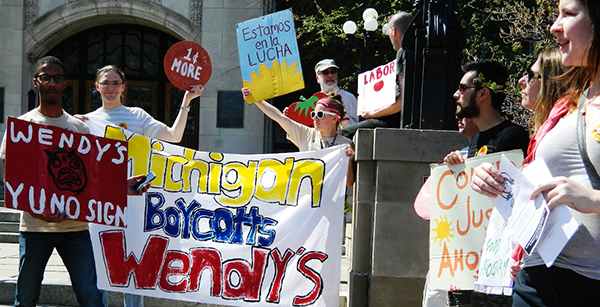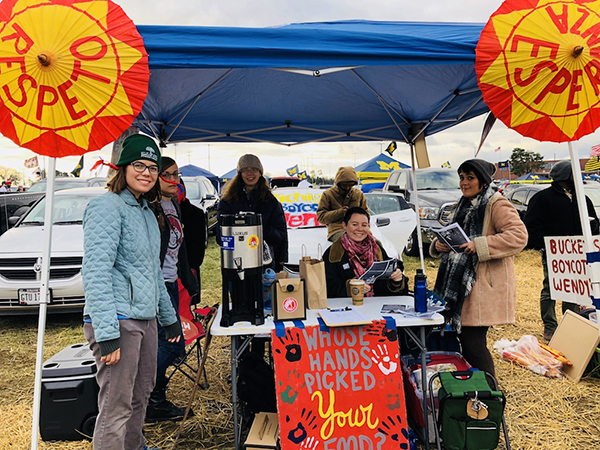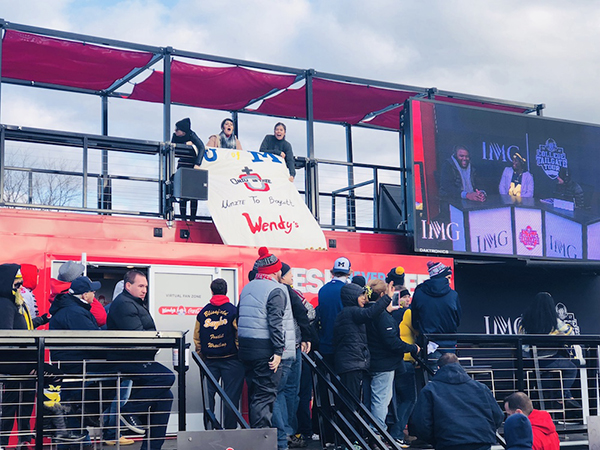
The Advisory Committee on Labor Standards and Human Rights’ recommendation to the University of Michigan President: “Become a signatory of the Fair Food Program.”
Meanwhile, UMich and Ohio State students team up to Boycott Wendy’s at this season’s rivalry football game!
There is big news out of the University of Michigan this season, and it has nothing to do with the Wolverines’ unfortunate fall from grace in the college football rankings this year.
Rather, it has to do with food justice, and a brand new report on the University’s growing commitment to leverage its market power to help bring “about significant changes in the level of transparency and state of working conditions” in the University of Michigan’s supply chain. Specifically, it has to do with “future opportunities to engage with and support worker-driven (social responsibility) initiatives, and perhaps to identify ways to promote this approach and these types of initiatives among the University’s current suppliers.”
Chief among those ways, according to the report? “Become a signatory of the Fair Food Program.”
So, that’s a lot to digest. Let’s back up a moment for some of the who, what, where, when and why of this remarkable news out of Ann Arbor. From the report’s Overview:
Scope
The President’s Advisory Committee for Labor Standards and Human Rights at the University of Michigan (UM) sponsored a student research team beginning in January 2017 to investigate social responsibility practices in the procurement of non-licensed food and electronic products. The team of four graduate and undergraduate students (herein referred to as the research team) were advised to conduct a study with the following objectives: identify the labor standards and human rights issues within these two categories; identify external partners to assist the university; contact universities who share similar perspectives and are willing to work with UM; and, present feasible pathways for improving labor standards in these two categories that outlines necessary tasks and cost.
It is a well-researched and documented study that covers a great deal of ground. We may return to the report in a future post for a closer look at the U. of Michigan’s history of commitment to human rights in its supply chain, the thinking behind the current study, and the report’s full range of conclusions and recommendations. But for now, we will excerpt the key sections most relevant to the Fair Food Program and to the Worker-driven Social Responsibility model of which the FFP is the pioneering initiative. There are three key passages from the report’s recommendations, and we will quote them in their entirety here below in the order in which they appear in the report:
On the Fair Food Program:
Become a signatory of the Fair Food Program
The Fair Food Program is the most comprehensive worker-driven social responsibility program in the U.S. While it is still relatively small in scope, it is growing and the University could support its efforts by becoming a signatory. A food service provider to Universities (Bon Appétit Management Company) is already a signatory of the Fair Food Program and works with its produce distributors to ensure purchase of Fair Food Program tomatoes during the appropriate season, so there is already a precedent for this type of relationship between a University food service provider and the Fair Food Program. The Fair Food Program has recently expanded into bell peppers and strawberries, and UM could investigate the possibility of purchasing those items from certified growers. Through this relationship with the Fair Food Program, UM may be able to encourage other growers to join the program and support its expansion.
On the Worker-driven Social Responsibility Model:
Maintain relationship with worker-driven social responsibility collaborative
In order to empower workers and forward the mission of upholding labor standards, UM could engage the Worker-driven Social Responsibility Collaborative [the WSR Network], a network of organizations promoting worker-driven social responsibility. Maintaining a relationship with this organization can help the University to identify future opportunities to engage with and support worker-driven initiatives, and perhaps to identify ways to promote this approach and these types of initiatives among the University’s current suppliers.
And on the possibility of collaboration with other like-minded universities to increase their market footprint, more adequately monitor labor conditions in their supply chains, and drive broader improvements in human rights conditions in their suppliers’ operations:
Create working group with other universities to explore joint efforts on the topic of ethical sourcing, starting with food
Initially, the research team suggests creating a working group with other universities interested in this topic to start identifying possible opportunities for coordinated responses to these issues, especially University of Washington and Notre Dame. Food may be the best topic to start with since many universities already participate in efforts to promote labor standards in food procurement, such as the Fair Trade Campaigns and the Real Food Challenge. The Real Food addresses additional concerns beyond working conditions, but there may be opportunities to engage schools who have specific ethical sourcing goals as part of their commitment to the challenge. UM should seek out other universities to create an informal working group.
Taken together, the report’s findings and recommendations present a complex and compelling analysis of the urgent need for ethical food sourcing on our nation’s campuses, which represent a significant force in the food market, particularly when acting in concert. The report is a powerful tool, as well, for students organizing on their campuses to build support for the Fair Food Program and WSR initiatives more generally. This goes for campuses across the country, not just at the University of Michigan, but at other schools mentioned in the report, including Notre Dame, the University of Washington, and the Ohio State University (yes, that OSU).
Football rivals turn friends, when it comes to farmworker justice…
Indeed, the report casts a clarifying light on the demands of the national, student-led “Boot the Braids” campaign, which calls on universities to end their contracts with Wendy’s until the company joins the Fair Food Program. As the UM report makes clear, for universities to stay true to their own values and goals, they must remain on the cutting edge of social responsibility — and reject the widely-discredited social responsibility practices of the past century.
The latest news from the Boot the Braids Campaign also comes out of the University of Michigan, from the big Michigan vs. Ohio State football game over Thanksgiving week (which also happened to be the last stop of Wendy’s College Tailgate Tour promoting the company’s official NCAA sponsorship). Students from both universities united against the fast-food holdout, using the massive tailgate event as a platform for raising consciousness about Wendy’s failure to address the rampant sexual violence and unchecked abuse farmworkers face in Mexico’s produce industry, where Wendy’s buys its tomatoes.
Operating out of a colorful Boycott Wendy’s tent — and demonstrating that shared concerns for human rights run deeper than even age-old campus rivalries — members of Washtenaw Solidarity with Farmworkers and Ohio State Student/Farmworker Alliance teamed up to educate and mobilize hundreds of fans and tailgaters around the national Wendy’s Boycott and local “Boot the Braids” campaigns at UM and OSU.

And, later, as thousands gathered to head over to Michigan Stadium for the big game, the team from the Fair Food Nation planned a pre-game show of its own. During a live broadcast interview with football all-stars Denard Robinson and Orlando Pace (representing their college football teams, UM and Ohio State, respectively), students climbed to the top of Wendy’s elaborate College Tailgate trailer for a dramatic banner drop!

During the reveal, “Boycott Wendy’s” chants echoed through the large crowd while students distributed hundreds of flyers to fans and passersby. The news of Wendy’s decision to shift its purchases to the abuse-ridden fields of Mexico and away from the award-winning protections of the Fair Food Program in Florida was shocking to many students, and generated a fresh wave of support among students for the ever-growing campaigns to end University of Michigan and Ohio State’s contracts with Wendy’s.
We will be following further developments from the Boot the Braids campaign at the University of Michigan as the new social responsibility report makes its way through the official administration channels and its recommendations are considered as potential University policy. There will surely be more news to come, so stay tuned as the Wolverine Nation turns its eyes from the gridiron to the griddle in the months ahead!
